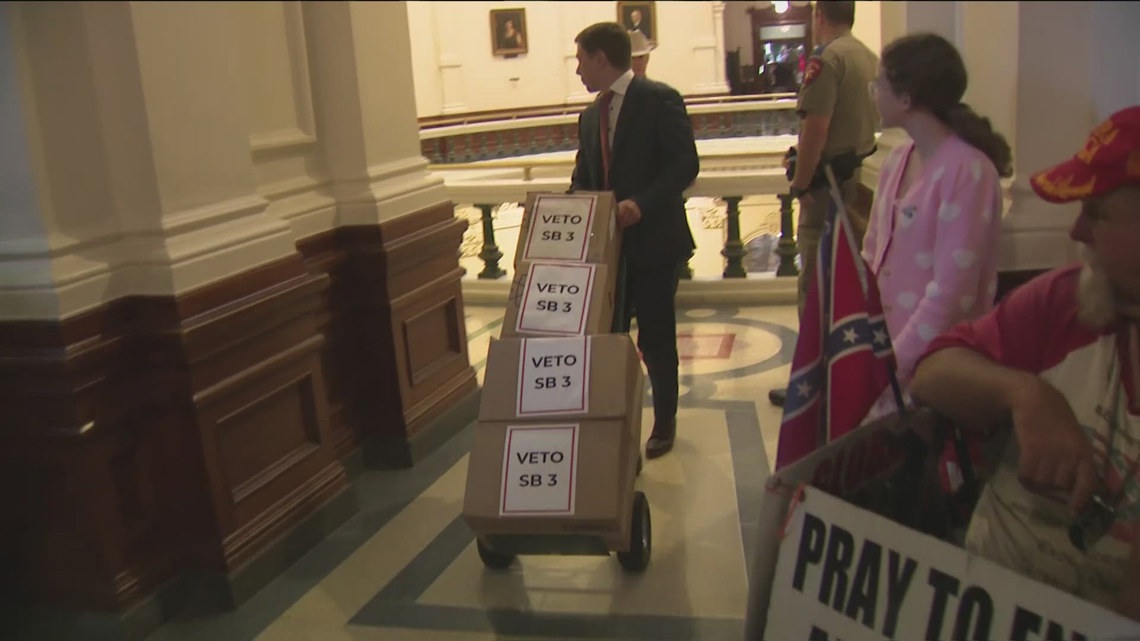AUSTIN, Texas — As Gov. Greg Abbott weighs whether to sign a bill into law that would ban consumable THC products sold at stores, supporters and opponents of the bill held dueling press conferences on the final day of the legislative session.
Senate Bill 3 is now on the governor’s desk after it passed in the House and Senate. The bill would only allow sales of CBD and CBG, cannabis compounds that won’t get users high.
Since 2019, products with 0.3% THC or less have been legal in Texas. The Senate’s version of SB 3 would end that and ban all forms of the psychoactive substance. THC, or tetrahydrocannabinol, is the predominant chemical in marijuana that gets people high. Generally speaking, it can be accessed in several forms, from the actual cannabis plant to THC-infused sodas.
Lt. Gov. Dan Patrick has led the push to ban the products. Last week, he held a press conference at the Texas State Capitol with a table of THC and CBD products – including cereal bites, gummies, lollipops and drinks – during which he outlined why he believes the products are dangerous and unregulated.
“This is not Dan’s folly. This is not Dan’s priority,” Patrick said last week. “This is to save an entire generation of being hooked on drugs.”
The products began appearing after Texas approved a farming bill in 2019. House Bill 1325 established the Texas Health and Safety Code Chapter 443. It allows for the sale of consumable hemp products across the state that do not exceed 0.3% delta-9 THC. That law has led to the sale of hemp-derived delta-8 THC and products that contain delta-9 THC at 0.3% of the total weight, which can still be an intoxicating amount at a high ratio.
Hemp advocates hold press conference
The Texas Hemp Business Council pushed back on that at a press conference of its own featuring industry leaders, farmers, small business owners and veterans.
“For the past six years, Texas law has mandated third-party lab testing and clear labeling. The only goal of these scare tactics was to frighten legislators and the public into going along with an agenda they did not ask for,” Cynthia Cabrera, a board member with the Texas Hemp Business Council, said. “The Texas hemp industry is comprised overwhelmingly of law abiding, compliant entrepreneurs, mom-and-pop stores, distributors and ancillary businesses.”
If signed into law, hemp industry advocates say the bill will not only dismantle a $4.3 billion industry supporting over 53,000 jobs but will also open the floodgates to unregulated, unsafe products in Texas.
“This bill doesn’t just ban products. It bans people like me from surviving in Texas; but it’s not just about me. It’s about the customers who will lose access to the only thing that helps them, the farmers who will stop planning, the manufacturers who will leave, the employees who will lose their jobs, and the communities that will suffer,” Tara Latil, a THC small business owner, said.
Texas VFW Senior Commander Dave Walden said for veterans like himself, THC products have been vital to keep them from taking prescription pills and using alcohol, and it helps them deal with things like PTSD and anxiety.
“These gummies are clearly labeled right there on the back – safe, regulated, and effective,” he said. “Since 2018, I haven’t touched a single opioid or any of the other drugs that I mentioned above. I’ve rebuilt my life. I’ve become a better leader, a better husband, a better father and ultimately a better man.”
The hemp-derived THC gummies that helped him would be banned under SB 3.
“Senate Bill 3 wants to turn this into contraband,” Walden said. “It wants to turn me and thousands of other veterans into criminals for choosing an alternative that works for us.”
The group delivered boxes of more than 114,000 petitions to Abbott’s office on Monday, encouraging the governor to veto the bill.
Supporters of ban hold press conference
Patrick said in the years since HB 1325 passed, more than 8,000 stores have opened that sell products with dangerous levels of THC.
Citizens for a Safe and Healthy Texas also held a news conference at the Capitol on Monday afternoon, where they encouraged the governor to sign the bill into law.
They said retailers have exploited the law and started selling products that contain three to four times the THC content that might be found in marijuana purchased from a drug dealer, and the products are marketed these products to children.
Medical marijuana program expansion
SB 3 does not impact the state’s medical cannabis program, the Compassionate Use Program.
State lawmakers signed off on final corrections to House Bill 46 on Monday. It expands and improves the state’s Compassionate Use Program, making more ailments eligible for low-THC cannabis. Those include chronic pain, traumatic brain injury, Crohn’s disease and patients in hospice or palliative care. It also permits more dispensing licenses and satellite stores to reach more patients.
State lawmakers expanded the state’s medical marijuana program this session, including adding chronic pain as a qualifying medical condition to the program and adding more dispensary licenses.
Walden said he supports expanding TCUP but said it can take a long time to ramp up and be very expensive.
“For a veteran that lives on disability, I went and explored TCUP. I did my own research – $500 a month is what it cost me versus $90 in gummies,” he said. “A veteran that lives on VA disability and makes a couple grand a month, and that’s all the income they have. How can they afford it?”
Abbott has until June 22 to veto any bills passed during the 89th legislative session.


